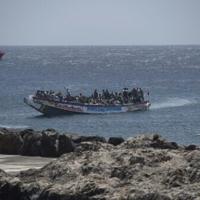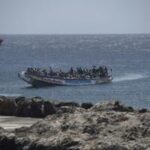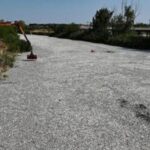A significant increase in migrant arrivals in Spain’s Canary Islands from Africa has sparked a heated debate in the country about how to address illegal immigration.
This issue gained attention during Spanish Prime Minister Pedro Sanchez’s three-day visit to West Africa, which concluded on Thursday.
The visit aimed to address the growing number of unauthorized migrants arriving in the Atlantic archipelago in search of a better life in Europe.
“Spain is committed to safe, orderly, and regular migration,” stated the Socialist premier upon his arrival in Nouakchott, the capital of Mauritania, the first stop on his tour which also included Gambia and Senegal.
He advocated for “circular migration” programs that permit individuals to enter Spain legally to work temporarily in sectors like agriculture, which experience labor shortages during harvest times, before returning to their home countries.
“Immigration is not a problem, it is a necessity that comes with certain challenges,” Sanchez emphasized.
His remarks faced immediate criticism from Spain’s main opposition Popular Party (PP), which argued that the statements could encourage more migrants to attempt illegal entry into the country, especially as the Canary Islands struggle to manage an influx of migrants.
Almost daily, Spain’s coastguard rescues boats carrying dozens of African migrants headed towards the seven-island archipelago located off the northwest coast of Africa.
Over 22,000 migrants have arrived in the Canary Islands so far this year, a notable increase from just under 10,000 during the same period last year.
The archipelago received a record 39,910 migrants in 2023, a figure that is likely to be surpassed this year.
– ‘Irresponsible’ –
“Encouraging a pull effect in the midst of the worst irregular migration crisis is irresponsible,” stated PP leader Alberto Nunez Feijoo, accusing Sanchez of going to Africa to promote Spain as a migrant destination.
This approach is contrary to the actions of other European Union nations, he added.
During the final leg of Sanchez’s tour in Dakar, the capital of Senegal, he took a tougher stance by highlighting the links between human trafficking rings organizing boat crossings to Spain and terrorist networks or drug smuggling gangs.
He emphasized that security is a “top priority” and stressed the need to repatriate those who have entered Spain illegally.
However, deportations require the cooperation of the migrant’s country of origin, which is often challenging to obtain.
– ‘Contradictory’ –
Cristina Monge, a political scientist at the University of Zaragoza, noted that while Sanchez attempted to strike a balance in his comments on the issue in Africa, his message appeared somewhat contradictory.
His initial speech in Mauritania reflected a European, human rights perspective, but his emphasis on deportations divided support, with gains on the right and losses on the left, she told AFP.
While the PP welcomed Sanchez’s increased focus on security, the hard-left party Sumar, the junior coalition partners in his minority government, immediately opposed it.
“Adopting the migration strategies advocated by the right is a failure and a mistake,” wrote Labour Minister Yolanda Diaz, who founded Sumar.
As the number of attempted crossings is expected to rise in the coming weeks when Atlantic waters calm, the controversy is likely to escalate, particularly since the PP has hardened its stance on the issue in response to the far-right party Vox, which opposes immigration.
The Spanish government estimates that around 200,000 individuals in Mauritania are awaiting to travel to the Canaries, the majority of whom are from Mali, where a military regime is combating an Islamist insurgency.
chz/ds/yad/rsc





